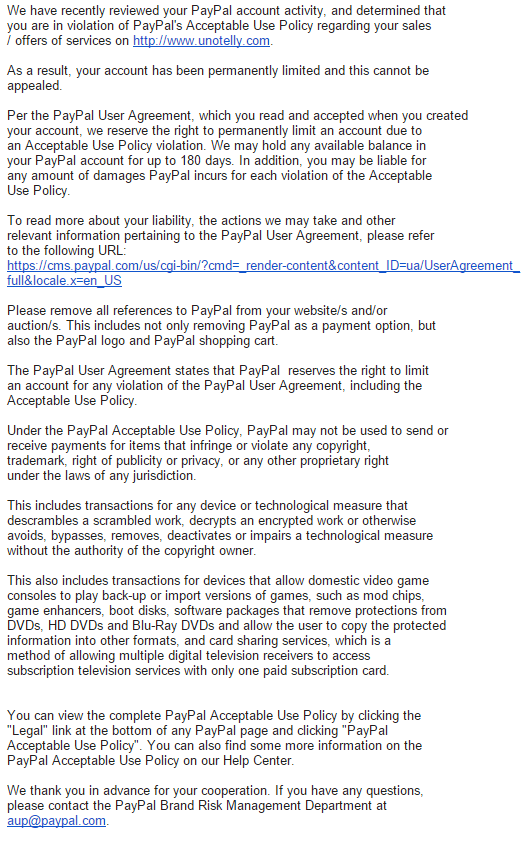PayPal started blocking VPN providers

This week it became known that PayPal payment intermediary has frozen the accounts of UnoTelly , a VPN and SmartDNS service provider. The reason for such actions in PayPal called the possibility of using VPN-services to violate copyright law.
In the explanatory letter sent to the provider, in particular, it says:
According to our rules of acceptable use of the service, PayPal cannot be used to send and receive payments for goods or services that violate copyrights, trademarks, rights to privacy or publicity, or other rights described in the laws of any jurisdiction. This includes all transactions for devices or technological measures that decrypt encrypted data or otherwise help to avoid, circumvent, or eliminate technological measures without the consent of the rights holders.
')
The letter stated that the account of the provider was permanently blocked, and this decision could not be appealed. Naturally, no advance notice was made by PayPal. Owners of the service are in shock, and upset by the lack of warnings about possible blocking.
It turns out that any company that provides VPN services or similar services may be subject to such blocking by one of the largest payment intermediaries. The site, and, in particular, in the “FAQ” section of the UnoTelly provider, is not explicitly mentioned anywhere that they are positioning themselves as a service provider that allows them to bypass any legal restrictions.
Of course, you can use VPN to bypass regional restrictions on services such as Pandora, Netflix, or Hulu. Netflix has already announced the start of a war with providers, as bypassing geographic locks violates the licenses used by the service. The head of the company said that such attempts will soon be subjected to ruthless blocking. But does this mean that VPN is in principle harmful, and it should be banned?
The second question is: why does PayPal, which positions itself as a payment intermediary, think that it has the right to decide which services using its services violate the laws of “any jurisdictions” and take such strict measures on the basis of these decisions? As far as is known, the blocking of the provider occurred in the absence of any court decisions or demands.
However, PayPal is fairly well known for the ease with which it blocks the accounts of both regular users and companies. On the same, rather shaky grounds, it has already caused inconvenience to other services: torrent trackers , Usenet providers and hosting providers engaged in the placement of files.

Full letter
Source: https://habr.com/ru/post/390263/
All Articles